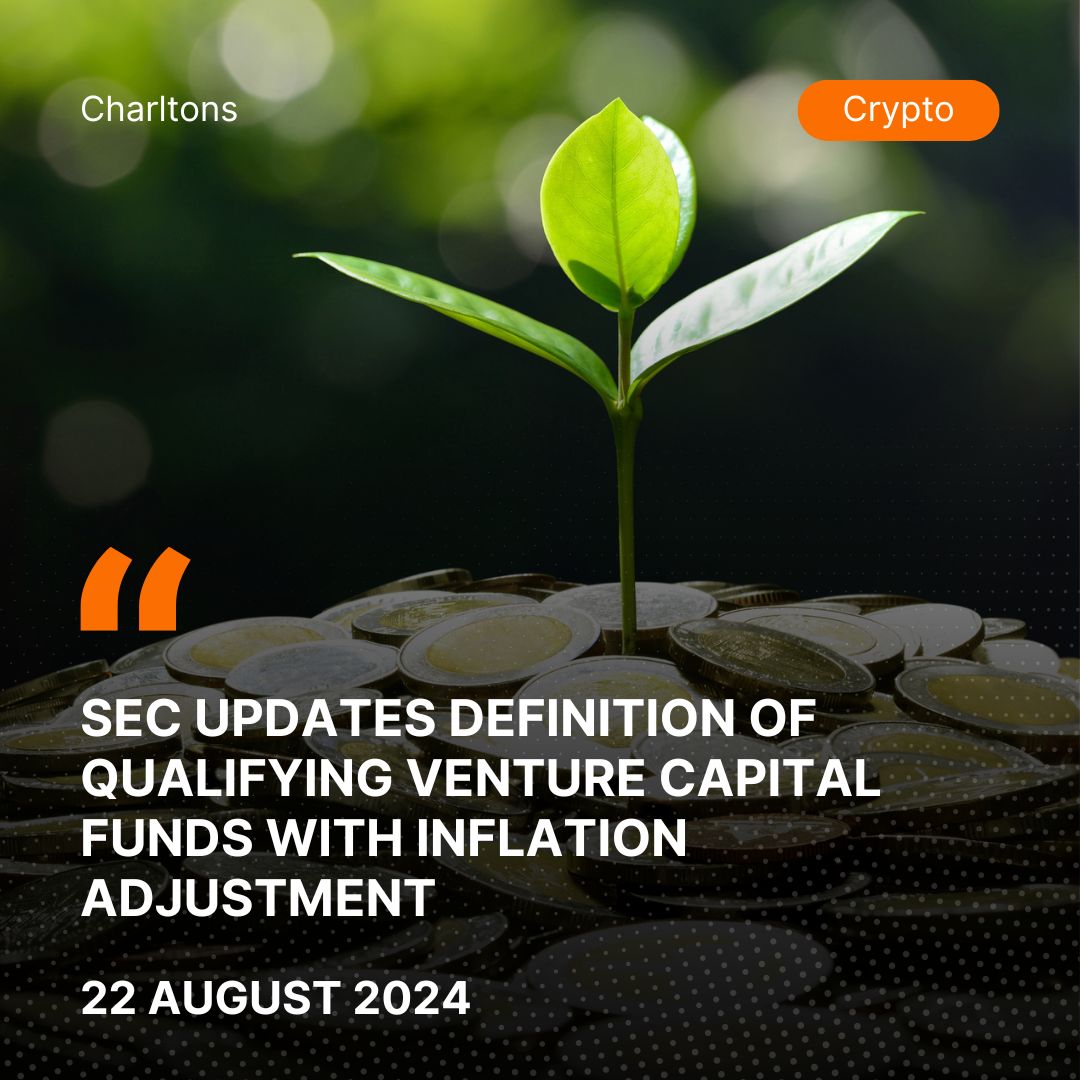
On 21 August, 2024, the Securities and Exchange Commission (SEC) adopted a rule change affecting the venture capital industry by adjusting the dollar threshold required for a fund to qualify as a “qualifying venture capital fund” under the Investment Company Act of 1940. This adjustment is mandated by the Economic Growth, Regulatory Relief, and Consumer Protection Act of 2018 (EGRRCPA), which requires the SEC to update this threshold every five years to account for inflation. Crypto venture capital funds, like their traditional counterparts, benefit from being classified as “qualifying venture capital funds” under the Investment Company Act because this classification exempts them from the more stringent regulations that apply to investment companies. The SEC’s proposed rule adjustment to increase the threshold for qualifying venture capital funds to $12 million is a positive development for the crypto industry. It provides more flexibility for crypto venture capital funds to raise and manage capital, encouraging continued investment in blockchain innovation.
The core purpose of the proposed rule is to adjust the financial threshold that determines whether a venture capital fund qualifies for an exemption from the more rigorous regulatory framework imposed on “investment companies” under the Investment Company Act of 1940. This exemption is critical for venture capital funds, as it allows them to operate with greater flexibility, free from the burdensome registration and compliance requirements that apply to traditional investment companies. The original threshold, set at $10 million in aggregate capital contributions and uncalled committed capital, was established under the EGRRCPA. However, this threshold is subject to inflationary pressures, which over time could erode its effectiveness. To counteract this, the EGRRCPA mandates that the SEC adjusts this figure every five years to reflect changes in the economic environment, specifically inflation.
It proposes to increase the current threshold from $10 million to $12 million. This adjustment is based on the inflation rate as measured by the Personal Consumption Expenditures Chain-Type Price Index (PCE Index), which the SEC has chosen as the most appropriate measure for this purpose. The PCE Index is a comprehensive indicator of inflation that captures price changes across a wide range of goods and services within the U.S. economy. By comparing the PCE Index values from May 2018, when the original threshold was set, to December 2023, the SEC determined that a $2 million increase in the threshold is necessary to maintain its intended impact.
The rule also establishes a structured process for future inflation adjustments. Every five years, the SEC will reassess the threshold using the PCE Index, ensuring that it continues to reflect current economic conditions. This approach not only provides a clear methodology for future adjustments but also offers stability and predictability for venture capital funds, allowing them to plan their capital-raising activities with greater certainty.
The proposed rule will become effective 30 days after its publication in the Federal Register. This timeline gives venture capital funds a short window to adapt to the new threshold, but the SEC expects the impact to be minimal, as the adjustment is primarily a technical correction to account for inflation.
From an economic perspective, the document includes an analysis of the potential impacts of the rule change. The SEC anticipates that the rule will have a minimal overall effect on the venture capital market, primarily benefiting funds that are currently near the $10 million threshold. For these funds, the increased threshold provides additional room to raise capital while still qualifying for the regulatory exemption. This is particularly important for smaller and emerging venture capital funds, which rely on this exemption to operate more flexibly and efficiently.
However, the document also acknowledges that the overall effect on the venture capital market is likely to be limited, as relatively few funds operate precisely at this threshold. The inflation adjustment is designed to maintain the status quo rather than to expand or contract the scope of the exemption significantly.
The proposed rule is designed to be minimally disruptive to the existing regulatory framework. It does not introduce new reporting or compliance requirements, nor does it impose additional burdens on venture capital funds. The SEC has certified that the rule will not have a significant economic impact on a substantial number of small entities, further underscoring its targeted nature.
In keeping with its standard rulemaking process, the SEC is inviting public comments on the proposal. Stakeholders are encouraged to provide feedback on various aspects of the rule, including the choice of the PCE Index as the measure for inflation adjustments, the estimated number of funds that will be affected by the change, and the broader economic implications of the adjustment. This feedback will help the SEC refine the rule and ensure that it effectively serves its intended purpose.
(Source: https://www.sec.gov/newsroom/press-releases/2024-102, https://www.federalregister.gov/documents/2024/02/21/2024-03436/qualifying-venture-capital-funds-inflation-adjustment)





